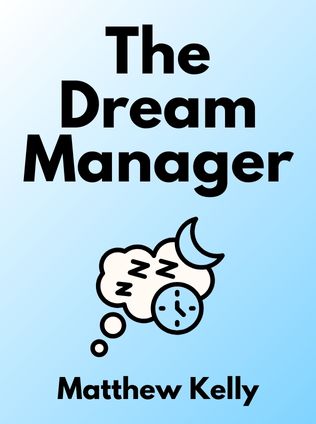
The Dream Manager
By Matthew Kelly
Published 08/2007
About the Author
Matthew Kelly is a renowned speaker, author, and business consultant. His influential works have inspired many to seek personal and professional growth. Among his notable books are The Rhythm of Life, The Seven Levels of Intimacy, and Perfectly Yourself. Kelly's unique approach to blending personal development with business principles has earned him international acclaim. His books have sold over a million copies and have appeared on numerous bestseller lists, reflecting the widespread impact of his ideas.
Main Idea
The Dream Manager by Matthew Kelly tackles the pervasive issue of employee disengagement in the workplace. The book, through a fictional narrative, explores the profound connection between personal dreams and professional engagement. It suggests that by helping employees achieve their personal dreams, companies can significantly boost morale, reduce turnover, and enhance overall productivity. The core message is that the true purpose of a company is not just to achieve its goals but to assist its employees in becoming the best versions of themselves. This mutual growth, Kelly argues, leads to a more dynamic and successful organization.
Table of Contents
- Part One: Desperation
- Part Two: The Initiative
- Part Three: Expansion
Part One: Desperation
The narrative begins with Simon Roberts, a general manager at Admiral Janitorial Services, who is disillusioned with his job. The company suffers from a staggering turnover rate of 400%, indicating deep-seated issues with employee morale and engagement. Simon’s journey starts with a simple realization: something needs to change. This section highlights the impact of disengagement on both personal and organizational levels.
"If, on average, your employees are 75 percent engaged, disengagement is costing you 25 percent of your payroll every month in productivity alone. The real cost to your business is, of course, much higher when you take into account how disengaged employees negatively affect your customers and every aspect of your business." - Matthew Kelly
Simon’s frustration mirrors a common experience among managers today. Many organizations grapple with similar challenges, struggling to find ways to keep employees motivated and invested in their work. Admiral’s high turnover rate is symptomatic of a deeper problem – a lack of connection between employees and their jobs. The turnover is not merely a logistical issue; it symbolizes a broader crisis of engagement, reflecting the disillusionment and lack of fulfillment that many employees feel. This dissatisfaction often stems from a sense of stagnation, where employees see no path for advancement or personal growth within the company.
Kelly poignantly describes the cost of disengagement, emphasizing that it goes beyond financial loss. The true price is paid in decreased morale, diminished productivity, and strained customer relationships. This sets the stage for a deeper exploration into how companies can revitalize their workforce by tapping into the personal dreams and aspirations of their employees.
Part Two: The Initiative
Simon and his boss, Greg, decide to tackle the turnover problem head-on. They begin by surveying employees to understand why they are leaving. The surveys reveal a primary issue: transportation. Many employees lack reliable means to get to work, particularly during non-traditional hours when public transportation is scarce or unsafe.
Sign up for FREE and get access to 1,400+ books summaries.
You May Also Like
The Subtle Art of Not Giving a F*ck
A Counterintuitive Approach to Living a Good Life
By Mark MansonRich Dad Poor Dad
What the Rich Teach Their Kids About Money - That the Poor and Middle Class Do Not!
By Robert T. KiyosakiHow To Win Friends and Influence People
The All-Time Classic Manual Of People Skills
By Dale CarnegieQuiet: The Power of Introverts
The Power of Introverts in a World That Can't Stop Talking
By Susan Cain



















